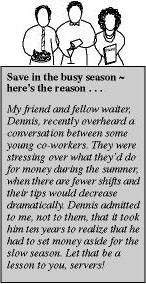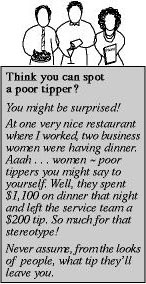|
Service as a career . . . and a lifestyle Restaurant service in the United States is not generally thought of as a glamorous or highly sought-after career. Many waiters, when asked what they do, say, "I work in a restaurant." In Europe, though, waiters are given extensive training and often have to apprentice for a number of years. There, service is considered an honorable and respected trade. Here, it's usually a way to support yourself until the "right" job comes along. Most servers I've worked with over the years never think of what they're doing as a career. They just happened onto restaurant service after having tried other jobs. There are more service jobs available than ever before. More than 5.4 million people held jobs in food and beverage service in 1998, the most recent year statistics are available. Waiter/waitress positions accounted for more than 2 million; bartenders more than 400,000, and hosts/hostesses more than 400,000. By 2006, total restaurant employment (both front and back of house) is expected to increase to a record 12 million.7 Service is not for everyone I've met very few chefs, for example, who are comfortable dealing with customers. They'd rather be in the kitchen. There are certainly drawbacks to this career choice . . . To this day, many restaurants donât offer medical, dental or retirement plans. This puts you in a similar position to someone whoâs self-employed, since it's up to you to provide insurance protection for yourself and your family and plan for your financial future. If you have chosen a career in service you're on a different schedule than most other people. You don't have a 9-to-5 job. You'll probably work Friday and Saturday nights -- and most holidays. I worked every New Year's Eve of my adult life until I started teaching. If you have seniority in a restaurant, you probably have Sunday and Monday as your days off. Relationships are difficult to maintain. You and your significant other probably work different shifts and don't see each other very often. Getting together for meals can be difficult, so this doesn't happen often in a "restaurant" family. Restaurant service does have its advantages . . . You don't work a 9-to-5 job. You don't sit at a desk all day doing the same boring things over and over. Every shift is different. You meet interesting people every day, most of them surprisingly nice (no, the majority of your guests won't treat you like their slave). You work in a clean, air-conditioned environment. When I'm finished with my shift, I rarely think about my job. I don't take work "home from the office" with me. You're surrounded by quick-witted, intelligent people. Restaurant servers are some of the brightest, most fun people I've ever known. Chances are that, as a server, your circle of friends will include others in the business, not only fellow servers, but chefs and restaurant owners. After a few years in the business, you're likely to know (from having worked with or for them, or having served them) some of the most influential people in your area. There's a great deal of immediate gratification in doing your job well. When a guest leaves my station having had a great dining experience, it makes me very proud. I know that a large part of the credit goes to me and to my service team.
First, what are tips? Tips is an acronym. It stands for: (okay, grammatically, it's to ensure prompt service, but you get the point!) Tipping isn't mandatory. Nor is it a city in China, as the old restaurant joke goes. It is, however, a longstanding custom in the United States. In Europe and many parts of the Caribbean, the tip is usually added directly to the guest check. In Japan, tipping is not generally expected unless some extra service has been performed. Until recently in China, it was inappropriate to tip. Times are changing there but, even now, only a 3% tip is the norm (and it's often appreciated if that tip is paid in U.S. dollars). In Hong Kong, servers expect at least 10% on top of any service charge that's levied. In Australia, some restaurants have a no-tipping policy, at other, the standard is 10%. There's a difference, though, between tips and service charges. Tips are intended solely for the service team. Service charges may be distributed any way that management feels is fair. In some cases, a portion of a service charge goes to the kitchen employees, who don't otherwise work for tips. Throughout my career, most of my two-week paychecks were for this amount: $0.00. Very few servers are paid the standard minimum wage. Because of their profession, most are paid an hourly rate of just $2.20, or thereabouts (Yes, this is legal, since it's assumed that they'll make up the rest in tips). By the time your taxes and any medical payments are deducted, your meager paycheck has disappeared. When I work as a server, I never look at individual tips. It doesn't really make any sense to do that since it all averages out in the long run. If I peek and see a good tip (18% or higher), it momentarily pleases me. If I look and see a poor tip (less than 15%), it's going to upset me and I'll lose focus on the other tables I have to serve. And, in the grand scheme of things, what does it matter? I do suggest that you keep a log of your tips and, at the end of the month, take a look at the total. If you're happy with what you've made, great. If not, itâs time to look for a new job.
What you need to keep in mind, with all that cash burning a hole in your pocket, is that you can't count on a paycheck to cover your bills. You have to set aside money for your rent, mortgage, utilities, car payment . . . And set a little aside, too, to treat the chefs to a drink or a cup of coffee next time they join you after the shift. Chefs are notorious for not having cash -- and servers always do. Consider this another way to improve relations between front and back of house. I've heard young waiters say, "I sure don't see myself doing this when I'm 50 years old." Well, you don't have to. Restaurant service is definitely not a dead-end career. There are lots of things that you can do after youâve had a successful career as a server, often while staying in the food service industry. Many servers go into restaurant management. Hotels, resorts and country clubs provide many opportunities to move up the career ladder. They'll often pay for you to go to school if you choose to continue your education. The larger hotel chains offer management schools and classes once you've been with the organization for a length of time. Servers can eventually become Food & Beverage Directors or General Managers of hotel restaurants. Many servers also choose to go into the banquet side of the business to become catering and sales managers. They start up their own businesses or work for independent caterers. Some go into other areas of tourism, working for convention and visitors' bureaus, air and cruise lines. Many open their own restaurants. Still others, like myself, become teachers or restaurant consultants. Often, servers are recruited by automobile dealerships and insurance companies for their sales abilities. There are many things you can pursue if and when you become tired of waiting tables. Let's look at some of the qualifications and qualities of a good server . . . |


